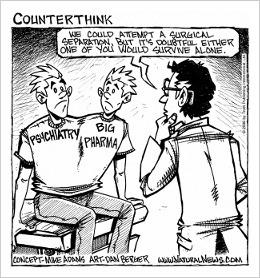The Edmond J. Safra Research Lab is currently conducting a five year project to study institutional corruption. The Lab currently supports a large number of projects that investigate the nature of institutional corruption through a variety of different contexts.
Copyright © 2024 The President and Fellows of Harvard College | Accessibility | Digital Accessibility | Report Copyright Infringement

 Although all medical specialties have come under scrutiny for financial conflicts of interest, the field of psychiatry has been at the epicenter of this "crisis of credibility" (Fava, 2006). Researchers, investigative journalists, and policy makers have raised questions about the extent of industry influence on the diagnostic and practice guidelines developed by the American Psychiatric Association (APA)....
Although all medical specialties have come under scrutiny for financial conflicts of interest, the field of psychiatry has been at the epicenter of this "crisis of credibility" (Fava, 2006). Researchers, investigative journalists, and policy makers have raised questions about the extent of industry influence on the diagnostic and practice guidelines developed by the American Psychiatric Association (APA)....  Abigail Brown's
Abigail Brown's Professionals are often influenced by conflicts of interest when they have a personal, often material, interest in giving biased advice. Although disclosure (informing advisees about the conflict of interest) is often proposed as a solution to problems caused by such conflicts, prior research has found both positive and negative effects of disclosure.
Professionals are often influenced by conflicts of interest when they have a personal, often material, interest in giving biased advice. Although disclosure (informing advisees about the conflict of interest) is often proposed as a solution to problems caused by such conflicts, prior research has found both positive and negative effects of disclosure. Professor
Professor  Creativity is the introduction of a novel and appropriate idea or product into a community that transforms the community in some way. Corruption is the decay or redirection of community resources away from a community's purpose toward a self-interested end. Both creativity and corruption alter the possibilities available to later community contributors. In an empirical study of seven contentious Wikipedia pages, Fellow
Creativity is the introduction of a novel and appropriate idea or product into a community that transforms the community in some way. Corruption is the decay or redirection of community resources away from a community's purpose toward a self-interested end. Both creativity and corruption alter the possibilities available to later community contributors. In an empirical study of seven contentious Wikipedia pages, Fellow  Working in conjunction with the Edmond J. Safra Center for Ethics, the Cultural Cognition Project is conducting an empirical investigation of how cultural cognition influences perceptions of the desirability, efficacy, and importance of public financing of political campaigns. "Cultural Cognition" refers to a set of psychological mechanisms that motivate individuals to fit their beliefs about policy-consequential facts to their preferred visions of the ideal society. Concepts and methods featureing cultural cognition have been used to understand public disagreements over myriad issues, from gun control to climate change....
Working in conjunction with the Edmond J. Safra Center for Ethics, the Cultural Cognition Project is conducting an empirical investigation of how cultural cognition influences perceptions of the desirability, efficacy, and importance of public financing of political campaigns. "Cultural Cognition" refers to a set of psychological mechanisms that motivate individuals to fit their beliefs about policy-consequential facts to their preferred visions of the ideal society. Concepts and methods featureing cultural cognition have been used to understand public disagreements over myriad issues, from gun control to climate change....  Surveys show that the majority of people believe Congress is rife with corruption (e.g. World Values Survey 2000). Despite this public consensus, scholarship on the topic is quite mixed, largely because most studies employ a "market model" in which desired policy outcomes are assumed to be purchased by contributors (Gordon 2005). A "social model" better captures the reality-a reality in which desired policy outcomes are gifted via an ongoing friendly, albeit corrupting, reciprocal relationship (e.g. Clawson, Neustadtl, and Weller 1998; Gordon 2005)....
Surveys show that the majority of people believe Congress is rife with corruption (e.g. World Values Survey 2000). Despite this public consensus, scholarship on the topic is quite mixed, largely because most studies employ a "market model" in which desired policy outcomes are assumed to be purchased by contributors (Gordon 2005). A "social model" better captures the reality-a reality in which desired policy outcomes are gifted via an ongoing friendly, albeit corrupting, reciprocal relationship (e.g. Clawson, Neustadtl, and Weller 1998; Gordon 2005)....  The principal investigator of this project is
The principal investigator of this project is  In the last two decades, the lobbying industry has assumed a central role among Washington’s policy-making institutions. Importantly, a large fraction of lobbyists employed in the Federal industry have experience in government positions, especially posts in Congress, the White House and leading executive agencies.
In the last two decades, the lobbying industry has assumed a central role among Washington’s policy-making institutions. Importantly, a large fraction of lobbyists employed in the Federal industry have experience in government positions, especially posts in Congress, the White House and leading executive agencies. The principal investigator of this project is
The principal investigator of this project is  Elected officials collect large sums of money to run their campaigns, and they often pay back campaign contributors with special access and favorable laws. Fellow
Elected officials collect large sums of money to run their campaigns, and they often pay back campaign contributors with special access and favorable laws. Fellow  Recently, policymakers in the US have become concerned about the relationships between medical trainees and pharmaceutical industry representatives, because such interactions may affect trainees' professional development and their future prescribing practices. Lab fellow
Recently, policymakers in the US have become concerned about the relationships between medical trainees and pharmaceutical industry representatives, because such interactions may affect trainees' professional development and their future prescribing practices. Lab fellow  Academic researchers operate within a unique economy where the goal is to seek and teach the truth about our universe, not to generate profit; indeed, ideas (not money) are the currency of exchange. As such, corruption in this context can be thought of as anything that prevents researchers from discovering the truth or anything that takes away from the public's opinion of the veracity of research findings.
Academic researchers operate within a unique economy where the goal is to seek and teach the truth about our universe, not to generate profit; indeed, ideas (not money) are the currency of exchange. As such, corruption in this context can be thought of as anything that prevents researchers from discovering the truth or anything that takes away from the public's opinion of the veracity of research findings.  Dr.
Dr.  In this project,
In this project,  Observers raised concerns over the effectiveness and the independence of the Nuclear Regulatory Commission long before the nuclear meltdown at Fukushima in Japan this past spring. President Obama, for one, said the agency has "become captive of the industries that it regulates" while on the campaign trail in 2007. But the Japanese nuclear disaster has focused a new spotlight on the commission and its ability to effectively oversee nuclear safety....
Observers raised concerns over the effectiveness and the independence of the Nuclear Regulatory Commission long before the nuclear meltdown at Fukushima in Japan this past spring. President Obama, for one, said the agency has "become captive of the industries that it regulates" while on the campaign trail in 2007. But the Japanese nuclear disaster has focused a new spotlight on the commission and its ability to effectively oversee nuclear safety....  The principal investigator of this project is
The principal investigator of this project is  In this project,
In this project,  Professor
Professor  Professor
Professor